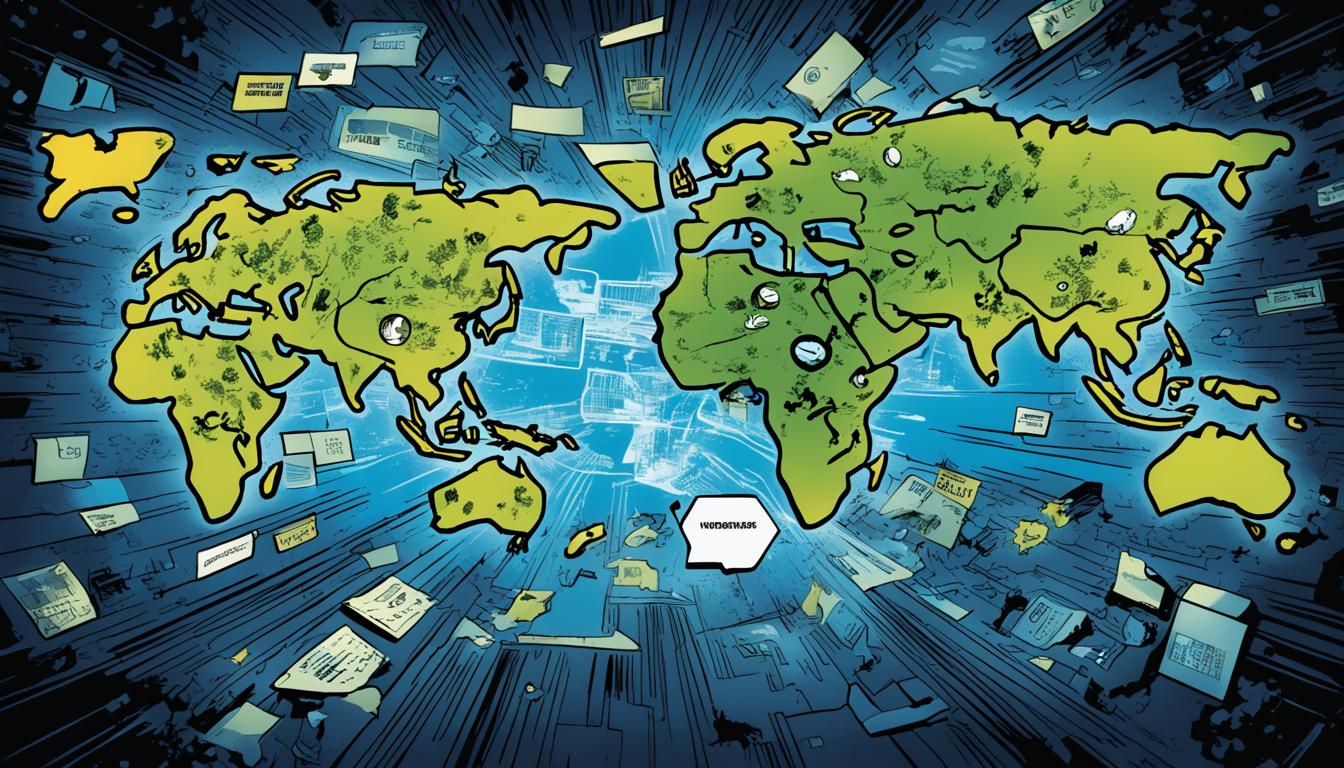A surprising statistic has come to light, showing the huge disruption from a major IT outage. This outage, affecting Microsoft systems, stopped operations around the world. Businesses are now looking for ways to cope, and users face widespread issues.
Contactless payments, flights, and even patient records at big hospitals were hit hard. This includes places in New York and California. The problem in Microsoft’s cloud services in the Central US is fixed. Yet, the world still feels the outage’s effects.
Key Takeaways:
- The global IT outage has caused chaos, with businesses and users worldwide experiencing disruptions in various industries.
- Flights have been grounded and contactless payments affected, impacting the travel and finance sectors.
- The outage has also affected media organizations, healthcare facilities, and government services.
- Cybersecurity firm Crowdstrike has been identified as the cause of the extensive IT problems.
- The scale of the disruption has led to significant declines in global financial markets, including stock indices and cryptocurrencies.
Networks and Media Services Impacted by the Outage
The recent Microsoft outage impacted various sectors, especially media. Sky News, for example, could not broadcast their programs. This left many without their trusted news source for some time. It showed how media services depend heavily on their systems working well.
But Sky News wasn’t alone in facing problems. Other outlets also had trouble with their broadcasts. At ABC, autocues and graphics weren’t working right. This made it hard for news presenters and their teams.
This outage didn’t just affect the media organizations themselves. It also impacted viewers relying on these services for news. It highlights the need for strong network systems in media.
In summary, the Microsoft outage disrupted many media organizations. Broadcasters faced issues, and their networks struggled. This event reminds us how important technology is in delivering news. It also shows the necessity for backup plans to keep delivering news without interruption.
| Global Outage Statistics | Last Week | Previous Week | Change (%) |
|---|---|---|---|
| Outages across all categories | 327 | 363 | -10% |
| ISP outages globally | 260 | 250 | +4% |
| Cloud-provider network outages globally | 4 | 11 | -63% |
| Collaboration-app network outages globally | 8 | 10 | -20% |
Travel Chaos Caused by Grounded Flights and Airport System Failures
The recent Microsoft outage has greatly affected the travel world. It led to flight groundings and system failures at airports. Concerns about new wireless tech in January also threatened to cancel thousands of flights, affecting many people.
Negotiations among big company CEOs, government officials, and the White House stopped a huge problem. They decided not to turn on over 600 5G towers near 87 airports. They also reduced the power of other towers. This was done to avoid any risk to flight safety.
The travel sector still saw a lot of problems, even with these solutions. Airlines like JetBlue and American had to stop many flights due to 5G concerns. Also, airports globally had IT issues because of the Microsoft outage.
In the US, Frontier Airlines faced issues, as did airports in Germany and Spain. Edinburgh airport had to check boarding passes by hand when their scanners stopped working. This led to delays and made travel difficult for many.
The consequences of these problems were serious. Passengers experienced delays and missed their connecting flights. The aviation world, already hit hard by the pandemic, faced more losses.
Aviation firms say it might take two or more years to fix or replace 5G-sensitive equipment. This is necessary for safe and reliable flights as new tech comes into use.
The recent travel problems show why good teamwork is important among tech companies, telecoms, and airlines. It shows the need for strong systems and backup plans to lessen future trouble.
“The recent disruptions in the travel industry serve as a wake-up call for all stakeholders involved. We must prioritize the safety and efficiency of air travel as we embrace new technologies and ensure that the necessary upgrades are in place to prevent future disruptions,” said an industry expert.
The FCC, set up in 1934, has a key role in managing radio frequencies to make sure there’s fair use for TV, cellphones, GPS, and more. Since 1994, it has sold spectrum rights through auctions, raising over $233 billion. This helps make sure frequencies are shared fairly and reduces congestion. That helps to balance the use and avoid overcrowding.

| Affected Areas | Actions Taken |
|---|---|
| Flights | Thousands of flights grounded |
| Airport Systems | Major airports experienced failures |
| Airlines | Regional jets from JetBlue, American, Delta, and United barred from landing in low-visibility conditions |
| Boarding Process | Boarding scanners offline at Edinburgh airport, leading to manual checks |
Financial Services and Banking Industry Affected by Outage
The Microsoft outage greatly affected the financial and banking industry. It caused disruptions for both companies and customers. Banks like Bendigo Bank, NAB, Commonwealth Bank, and Westpac faced issues. This led to service disruptions, impacted financial services, and failed payments.
One major area hit by the outage was the payment system. Many people had trouble making payments, including contactless ones. This was a hassle for individuals and a challenge for businesses relying on electronic transactions.
The outage also showed how much the financial sector depends on Microsoft. Banks use Microsoft’s infrastructure and services for daily operations. The issue has exposed these systems’ vulnerability. It shows the need for strong backup plans and alternative solutions.
The disruption has underlined the need for emergency plans. The financial services sector has to be very resilient. Banks have worked hard to fix the problems and get services back, while keeping systems secure.
Despite the havoc, some banks have showcased their advanced approach. Capital One stood out in Evident’s analysis of the top 50 North American banks. It was ahead in adopting cloud computing which boosts scalability, flexibility, and cost-effectiveness.
Capital One has also been a leader in using open source software and working closely with developers. They introduced Eno, a virtual assistant, to help improve customer service.
Capital One’s leadership in using AI is notable. The bank has a dedicated AI team. This team works on improving efficiency, gaining deeper customer insights, and better risk management.
The Microsoft outage has posed major challenges but has also emphasized the need for constant enhancement and innovation against tech disruptions.
| Recent Banking Failures | Largest in the US since the 2008 Financial Crisis |
|---|---|
| Silicon Valley Bank | – |
| Signature Bank | – |
| First Republic | – |
The Microsoft outage is not the only recent disruption. Three mid-size US banks, Silicon Valley Bank, Signature Bank, and First Republic, faced major issues. They have been closed and sold since the beginning of March. These failures are the biggest setbacks for US banking since the 2008 crisis.
Credit Suisse, a major global player, is going through a rescue deal in Europe. It received a $50 billion emergency lifeline from the Swiss National Bank to help with its troubles.
The importance of deposit protection cannot be understated. In the UK, the Financial Services Compensation Scheme protects deposits up to £85,000 per person. For joint accounts, the protection is £170,000.
In the US, government protection covers up to $250,000 in deposits. There’s a proposed increase for business accounts considering the current crisis.
Tighter regulations and capital requirements have been established since the 2008 crisis. These are designed to make financial institutions more stable and resilient. They protect customers’ interests and the economy.

Outage Extends to Government Services and Public Sector
The widespread Microsoft outage has hit government services and the public sector hard. It’s causing trouble and wait times in many departments and agencies.
Courts had to shut as government systems stopped working. This led to hearings being put off and legal cases getting delayed. Not being able to get to important documents and info slowed down the justice process. This created more issues and hold-ups for the legal world.
Moreover, public services that depend on Microsoft software, like Services NSW, faced major issues. People found delays in getting driver’s licenses renewed, car registrations, and property deals done. This was a headache for residents and businesses alike.
However, it’s key to remember emergency services were okay. Services like Triple Zero in Victoria ran smoothly, offering quick help when needed.
The Vulnerability of Government Systems
The Microsoft outage has exposed how open to risk government systems are to tech problems and cyberattacks. Other events, like the SolarWinds hack, show federal agencies and government bodies are open to security threats and service breaks.
Even though this outage wasn’t caused by a cyberattack, it reminds us of the damage such events can do. Government functions that are crucial could be hit hard. This underlines the need for better safety measures and strong cyber protection to keep public services and government infrastructure safe.
Ensuring Resilience and Security
Government agencies have to focus on investing in IT setups that are secure and can bounce back from issues. This means doing regular security checks, updating software on time, and using advanced ways to watch for threats and viruses.
Also, the government should work closely with tech partners and security pros to make sure the systems are tight. Building stronger ties and sharing info with private groups can help find and fix weak spots more effectively.
| Impact of the Outage on Government Services | Consequences |
|---|---|
| Court closures | Postponed hearings and delayed legal proceedings |
| Services NSW disruption | Delays in driver’s license renewals, vehicle registrations, and property transactions |
| Emergency services | Unaffected, ensuring continued public safety |

The Microsoft outage is a signal for governments everywhere to make cybersecurity and resilience top priorities. By putting money into the right tech and strong security steps, governments can keep important public services safe. This ensures they keep running smoothly, even when faced with tech troubles.
Cybersecurity Firm Crowdstrike Identified as Cause of Outage
Cybersecurity company Crowdstrike was behind the recent Microsoft outage. It caused big problems worldwide. A bad update was to blame, messing up Windows systems.
The issue led to crashes and errors. Many services depending on Microsoft were affected.
Organizations using Windows felt this the most. It disrupted communication and customer service. Email stopped, orders were delayed, and work flow suffered.
Crowdstrike is fixing the problem. Their technical team is updating the software. They’re working hard to reduce further issues.
Testing and quality checks are crucial for updates. This event shows how a small mistake can have big impacts worldwide.
The Severity of the Crowdstrike Software Issue
The problem with Crowdstrike’s software was big. It showed how digital systems can fail. A single update caused lots of trouble for Windows users.
It taught organizations to have good backup and recovery plans. Many had to spend a lot to recover.
The effects were long-lasting for some companies. It’s a reminder of how important it is to fix and prevent future problems.
The Evolution of Malicious Activities
The outage shows the changing cybersecurity dangers. It connects ransomware attacks to system weaknesses.
CrowdStrike says Dridex malware now targets businesses. This shift to “Big Game Hunting” shows attackers going after bigger targets.
| Statistics | |
|---|---|
| Critical Vulnerability | Log4Shell |
| Severity Rating | 10 out of 10 |
| Estimated Impact | Millions of servers at risk globally |
| Reporting and Patch Release | Found by Alibaba, fix took two weeks |
| Challenges in Applying Fix | Issue with third-party Apache software users |
It’s important to stay alert to cybersecurity threats. Organizations need to defend their systems actively. Good security measures can block many risks.
Improving security systems helps protect against surprises. Businesses can keep running smoothly.

Conclusion
The global Microsoft outage caused huge problems everywhere. It hit many industries like media, airlines, banks, and government services hard. This event showed how linked our software systems are and what can happen when one part fails.
In Australia, about 48 services were hit by this meltdown. Stores like Woolworths saw long lines and couldn’t process payments. Big airlines like Qantas, Jetstar, and Virgin Australia had flights canceled or delayed, especially at Sydney Airport.
Financial and telecom companies, along with emergency services, felt the outage’s impact. But, it’s key to mention, emergency teams, including Triple-0, kept working hard. They made sure everyone stayed safe during the chaos.
This incident teaches us a lot. Companies need to have strong backup plans and test software updates carefully. This helps make our tech systems tougher and reduces problems if something goes wrong. The outage shows how important technology is in our lives. It reminds us to keep our systems reliable in our tech-driven world.










